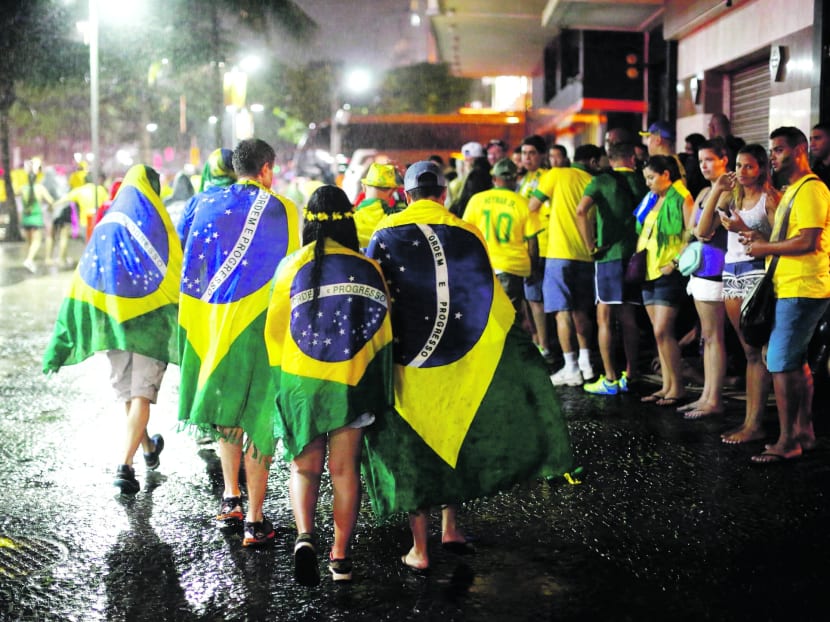A World Cup built on a lie
BELO HORIZONTE — The party is over. The carnival that has gripped Brazil the past month came to a shuddering, embarrassing halt at the hands of Germany. The green and yellow bunting that has bounced in patriotic joy down every street in the country now dangles limp. The hangover has set in, and it is likely to be a long and painful one.

Dejected Brazil fans count the cost of their country’s failed bid to win the World Cup on home soil. Photo: REUTERS
BELO HORIZONTE — The party is over. The carnival that has gripped Brazil the past month came to a shuddering, embarrassing halt at the hands of Germany. The green and yellow bunting that has bounced in patriotic joy down every street in the country now dangles limp. The hangover has set in, and it is likely to be a long and painful one.
Following the German demolition job, the future looks suddenly bleak. For the players, the trauma could be a sustained one. For Luiz Felipe Scolari, the rest of his life loooms as the manager who failed his nation. That is some burden.
But the people who will be really nervous are the politicians behind the competition, those who brought it here in the first place. For them, the idea that Sunday would see the ultimate party for the host nation was imperative. And now it has been ripped from them.
The country’s leaders absolutely required their team to make the final. For them, failure was not an option. The £8 billion (S$17 billion) bill for the tournament had produced precious little in the way of tangible economic benefit. The infrastructure projects planned to emerge around it have never materialised. In Fortaleza in the northeast, the half mile or so laid down of a city-wide metro system that was meant to be completed in time for the competition’s start, lies rotting in the tropical sun.
When first mooted, this was meant to be a competition that showcased Brazil as a modern, thrusting, ready-to-do-business economy. The focus changed when it became clear all it would deliver was a bunch of hugely expensive white elephant stadiums. Then it was sold as the chance to prove that Brazil is the best in the world at something. Winning the trophy, adding that sixth star to the crest on the national jersey, became the sole imperative. Sure, it may have cost money, was the insistence from those in charge, but hey it will be worth it when we’re all dancing around Rio with the Cup.
Winning became everything. All that mattered. For the politicians who had staked so much on this project, victory was essential. If they couldn’t provide the bread, they had to make sure they offered the circus. And when that circus failed to materialise, it was the politicians who were immediately blamed. The country’s president. Dilma Rousseff, was dismissed in the most vituperative terms. Her prestige, so associated with this competition, had just evaporated.
In many ways the on-pitch embarrassment was the ultimate reckoning for a tournament always built on a lie. Initially that lie was that it would transform the country economically. Then it became the lie that football success would restore national self-esteem, a lie because the playing resources available were utterly inadequate for the task.
But then, the idea that any wider benefit could be derived locally from hosting the competition was always a fanciful one.
One evening in Fortaleza, I saw something that perfectly summed up who is benefiting most from this World Cup. In a restaurant, a bunch of FIFA representatives were having a team session. They were enjoying their caipirinhas, chatting loudly in that oddly accented English-as-a-second-language that is the lingua franca of international sport. They were having a ball.
Leaving the restaurant, I walked past a sight that will live with me for a long time. On a narrow concrete shelf under the portico of an office building, an entire family were sleeping: A mother, stretched out on her back, asleep on the concrete with two toddlers lying prone on top of her. Around them were pulled their few, sad scraps of possessions.
It was a sight that was a pertinent reminder that when it comes to the beneficiaries of major sporting events, those at the head of the queue for long-term rewards are the ones wearing blazers. And those at the back are the locals obliged to pay the bill. After Tuesday night, now those locals don’t even have sporting success to sustain them.





